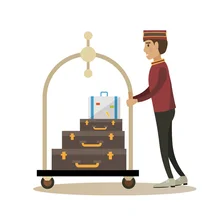
In-depth - Sport & leisure: Checking in to sport and leisure

From spas and bars to golf breaks and weddings, hotels and B&Bs are diversifying into more areas and the wide variety in the market could present an opportunity for brokers, reports Sam Barrett
Watching a sports event while you’re enjoying a couple of nights in a luxury hotel is a great way to spend a weekend. But the sports and leisure market also offers plenty of opportunities to brokers looking to develop their specialist knowledge.
There’s plenty of appetite from insurers for the right risk, with well managed hotels and sporting venues particularly attractive. “There’s lots of capacity in both markets,” says Geoff Kirk, managing director of Marshall Wooldridge. “Rates for hotels are mixed, reflecting the huge variety in this market, while in the sport sector, they’re fairly steady.”
It’s not all rosy though and there are some areas that can prove much more difficult to cover. As examples, the risk of injury has made both adventure playgrounds and trampoline parks too much for many insurers.
Common interests
As well as plenty of capacity for the right risks, the two sectors also share some common characteristics when it comes to exposures. Sam Thomas, head of mid-market at Zurich UK, explains: “Due to the provision of services to the public, sports and leisure businesses are exposed to liability to injury, most commonly slips, trips and falls.”
This opens up a great opportunity for risk management advice. Regular risk assessments, coupled with proactive housekeeping, can help to keep these venues safe and ensure that members of the public enjoy injury-free visits.
As an example, bars are common in many hotels and sports venues, but the combination of glass, spilt liquids and alcohol can create a dangerous risk cocktail. “You need to understand the risk management processes,” says Kim Appleby-Jones, client director at Konsileo. “For instance, what are the procedures for glass collection from the bar and is there a written operational procedure for dealing with slippery floors caused by spilt drinks?”
The two markets also share similar staffing arrangements. Whether the peak season is summer, a wedding or a sports tournament, both can rely on a flexible workforce. But bringing in staff on this casual basis can drive up risk, so it’s essential that these venues deliver appropriate training to these individuals as well as more permanent staff, especially around areas such as health and safety and managing risk.
Alongside their casual staffing arrangements, sports and leisure venues can also find themselves running one-off events, such as weddings, conferences and firework displays. It may only be a day or even just an evening, but Thomas says it’s essential to consider all aspects of the business’s activities and assets to set the right cover. This can require a broker to work closely with the organisation to really understand how it operates.
There’s lots of capacity in both markets… Rates for hotels are mixed, reflecting the huge variety in this market, while in the sport sector, they’re fairly steady
Geoff Kirk

Insurer support
Specialising in these areas will enable a broker to build expertise but insurers can also provide valuable support. This can include risk management advice but also tailored wordings to ensure the cover reflects the risk.
Sarah Beard, hospitality division manager at Ryan’s, says she receives plenty of support from insurers in the leisure market. “We have regular meetings with account managers to discuss the latest trends and emerging risks,” she says. “They’ll also help with premiums if we’re struggling to retain a client.”
Insurers can also provide risk management tools. As an example, as well as its in-house risk engineers, Zurich has a digital platform to help brokers and their clients assess risk. “This provides insights and information on recommended practices to help customers identify key areas of exposure,” says Thomas. “By using our tried and tested risk grading methodology, customers can get the most from their risk improvement activity and budget.”
And, while your Wembleys, Murrayfields and the large hotel chains may be well looked after, finding a niche and developing the expertise and reputation to take it national, presents a golden opportunity for brokers interested in this market.
Leisure
From five-star boutique hotels with their own spas and golf courses through to family-run bed and breakfasts with a couple of bedrooms, there’s plenty of choice when it comes to arranging accommodation for a weekend away. But, with so much variety in the market, it’s important that risks are well understood.
“The hotel and accommodation industry has diversified greatly over the last 10 years,” says Appleby-Jones. “As this results in many new exposures that have not previously been considered, we will always visit our clients to fully appreciate the activities and subsequent exposures.”
Accommodation can certainly be much more than just a bed for the night. Modern hotels can provide everything from fancy bars and restaurants through to swimming pools, sports facilities and spas. Many will also offer a variety of different events, such as conferences and weddings, which will all have a bearing on risk.
Some risks are common to all in the sector. “These businesses will have property and casualty exposures for risks such as fire, flood or a guest or employee injuring themselves,” says Paul Rickards, commercial broking account manager at The Bateman Group. “They should also consider business interruption if something serious prevents them from operating.”
The more a hotel expands its offerings to entice guests through the door, the more exposures they take on… It could be a sauna fire; storm damage to a marquee; a guest falling from a golf buggy; or even a golf buggy ending up in a nearby lake
Laura High

Risks and relaxation
The requirements can be relatively straightforward at the smaller end of the market. Sarah Beard, hospitality division manager at Ryan’s, specialises in cover for small B&Bs. “They’re a good risk,” she says. “Often it’s a family home where the kids have grown up and the parents have turned the spare bedrooms into a business. Cover resembles a household policy, covering fire, flood and theft, with extensions for additional risks such as liability and business interruption.”
Go larger and the risk profile changes. “The more a hotel expands its offerings to entice guests through the door, the more exposures they take on,” says Laura High, director at commercial insurance brokerage Yutree Insurance. “It could be a sauna fire; storm damage to a marquee; a guest falling from a golf buggy; or even a golf buggy ending up in a nearby lake.”
Putting in place the right risk control measures wherever possible is essential. As an example, Zurich UK’s Thomas, says the combination of the timber construction and the high temperatures makes a sauna a relatively high risk of fire. “It can be something as simple as a towel left in the wrong place that starts the fire,” she explains. “The design, fire protections and instructions on the safe use of saunas are very important, along with inspections, surveillance and maintenance.”
Fire and water
Even something as relaxing as a spa can cause insurers to twitch. Appleby-Jones says that as well as increased liability risk from the treatments provided, even the oils used can push up risk. “Certain oils can impregnate bath robes and towels, increasing fire risk,” she explains. “We’d explore the risk management in place, finding out where used towels and bathrobes are temporarily stored until they are sent for cleaning.”
Providing sports facilities such as a gym or swimming pool can also make insurers’ heart rates race. Given the risk of accidents and even fatalities, insurers will often require these facilities to be watched by a suitably trained member of staff.
Although swimming pools are more unusual at the B&B end of the market, Beard’s experience shows the difficulties that can arise when trying to cover them. “Insurers aren’t always happy to include them on standard cover so we might have to get a separate policy elsewhere,” she explains. “With some of the other additional features, an insurer might include conditions within the policy wordings to help mitigate the risk.”
As an example, offer a jacuzzi, and the B&B owner might find their insurer insisting that they provide disclaimers to guests who want to use it and keep a log of when it’s cleaned and maintained.
Staff support
Whether a small B&B or a hotel with more than a thousand beds, hotel owners must also ensure appropriate measures are in place to protect employees. “Staff turnover can be really high in hotels, especially where they rely on students for seasonal work,” says Geoff Kirk, managing director of Marshall Wooldridge.
“Training must be provided so employees understand the risks and don’t injure themselves or the guests. It’s also essential that this is recorded to show the training took place.”
As well as helping them put appropriate risk management in place, brokers can also provide valuable advice when it comes to determining the level of business interruption cover that’s required.
Kirk says that businesses often under-estimate how long it will take to rebuild after a fire. “If you’re dealing with a Grade II listed building you need to have an indemnity period of three years as a minimum,” he explains. “It will vary though and we see a lot of hotels that are listed buildings with new builds attached. That can mean they’re able to get up and running much faster.”
Securing a long enough indemnity period is important but it’s also vital that these businesses have a good understanding of the revenue at stake if they did have to close temporarily. Thomas says this is especially pertinent where a business takes large block bookings far in advance for big events such as weddings or conferences. “Brokers can help customers to evaluate how a serious event might affect revenues, as well as consider what mitigation options are available, such as the use of external caterers or temporary structures,” she adds.
And, with so much variety in the accommodation sector, getting under the skin of these businesses to fully understand their insurance and risk management requirements is essential.
Only users who have a paid subscription or are part of a corporate subscription are able to print or copy content.
To access these options, along with all other subscription benefits, please contact info@insuranceage.co.uk or view our subscription options here: https://subscriptions.insuranceage.co.uk/subscribe
You are currently unable to print this content. Please contact info@insuranceage.co.uk to find out more.
You are currently unable to copy this content. Please contact info@insuranceage.co.uk to find out more.
Copyright Infopro Digital Limited. All rights reserved.
As outlined in our terms and conditions, https://www.infopro-digital.com/terms-and-conditions/subscriptions/ (point 2.4), printing is limited to a single copy.
If you would like to purchase additional rights please email info@insuranceage.co.uk
Copyright Infopro Digital Limited. All rights reserved.
You may share this content using our article tools. As outlined in our terms and conditions, https://www.infopro-digital.com/terms-and-conditions/subscriptions/ (clause 2.4), an Authorised User may only make one copy of the materials for their own personal use. You must also comply with the restrictions in clause 2.5.
If you would like to purchase additional rights please email info@insuranceage.co.uk








